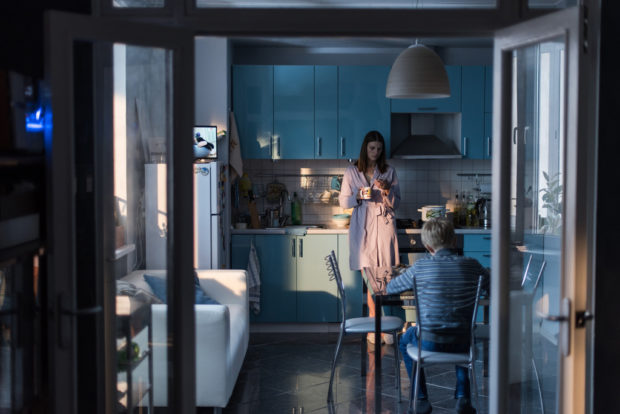 A couple in the midst of divorce tragically neglect their 12-year-old son, in Andrey Zvyagintsev ‘s portrait of spiritual malaise in today’s Russia.
A couple in the midst of divorce tragically neglect their 12-year-old son, in Andrey Zvyagintsev ‘s portrait of spiritual malaise in today’s Russia.
During Russia’s gradual descent back to dictatorship, one prominent film director has unsparingly depicted the spiritual rot in the heart of his country. With five features in fifteen years, Andrey Zvyagintsev has dissected his country’s malaise in stories of damaged relationships, families, church, and state. His latest is called Loveless, for which he also wrote the screenplay with frequent collaborator Oleg Negin.
Loveless presents us with a couple, Boris and Zhenya, played by Aleksey Rozin and Maryana Spivak, who are going through a bitter divorce. Caught in the middle is their 12-year-old son Alyosha, whom we discover was born without being wanted by either parent. Zhenya even reveals at one point that she had wanted to get an abortion. The boy eavesdrops as his selfish parents argue viciously. Zhenya, who is now seeing a wealthy businessman, proposes sending Alyosha to an orphanage. Boris is also with someone else now, a younger woman pregnant with his child, but he’s paranoid about his boss, a fundamentalist Christian who fires any employee that is divorced or doesn’t have a family. The boy quietly weeps in his bedroom, and the eventual crisis centers around him.
It’s easy to condemn the callous disregard of these parents, but Zvyagintsev uses crisis to reveal the buried humanity of these two lost souls. We meet Boris’s bigoted grandmother, who treats him and his wife with undisguised contempt, and in addition he is caught up in the escalating demands of his pregnant girlfriend. Zhenya is absorbed in social media, constantly on her cellphone, regarding her actual world with irritation and impatience.
The story expands to include the immediate social environment, including the police and a neighborhood organization, and we see that the remoteness and alienation of the main characters are not unique, but a feature of Russian society. As always in a Zvyagintsev film, the physical landscape reflects the characters’ inner desolation. We see huge impersonal buildings, relics of the Soviet era, now forbidding and decrepit, surrounded by barren fields and woods and polluted streams. In the background, on radio and TV, are stories about the supposed apocalypse predicted by the Mayan calendar, along with reports on the 2012 U.S. election. People’s lives seem to be ruled by the anxiety to secure enough money, and by an overwhelming sense of sanctioned corruption. In this director’s vision, Russia is not a healthy place to live, for children or adults.
Zvyagintsev has an eye for the unexpected detail, and for lingering on a scene past the point where most directors would hurry on to the next plot development. We are invited to contemplate this fallen world, and what it means to live in it. It’s a bracing vision of brutal honesty, honesty that is the absolute precondition for any sense of compassion or authenticity.
I saw it in a movie theater a few months ago, but as happens too often with foreign films, it was gone too soon for me to review on the show. Now it’s finally available on DVD. Loveless is a stark reminder of the price we pay when we neglect the love which is life’s meaning.

Wes Anderson’s playful new film is presented as an issue of a Paris-based American magazine, with three stories about the eternal appeal of non-conformists....

The story of an African immigrant in Paris, working under the radar while trying to obtain refugee status. The plight of the migrant, and...

Toshirô Mifune plays a cop in postwar Tokyo who has suffered the humiliation of having a criminal take his gun from him, in one...